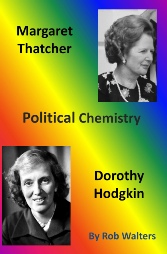
If you like it, please share it

Intriguing new book on two famous Oxford Ladies
By Rob Walters
Most people do not know what a crystallographer does, and if asked to name one crystallographer, most of us would need to call a friend... and the friend would probably need to visit Wikipedia.
Everyone knows what a UK Prime Minister does, or what he or she should do. If asked to name one they could and could certainly name the first woman Prime Minister of the UK, though some would not want to do so. Yet they probably could not name the only UK woman to gain a Nobel Prize in science, even though these two women should be equally famous.
Most people know that the UK's first woman Prime Minister began her adult life at
Oxford University studying chemistry. However, chemistry is a big subject, surely
she had to specialise -
Now, Dorothy was not at all like Margaret Thatcher: she had a communist lover, eulogised the Soviet Union and Communist China and was a pacifist. Margaret, even as a student, was an avowed Conservative and chauvinist. So what would these two women talk about? That is exactly the question author Rob Walters endeavours to answer in his book "Political Chemistry: Margaret Thatcher and Dorothy Hodgkin”
It's good, very good! Peter Ashby FRSA, Consultant.
I read the first few chapters of Margaret and Dorothy’s conversations last night
and enjoyed it – on a number of levels: the well-
Really enjoyed the book. The subject matter is fascinating, whetted my appetite to read more ... haven't read anything on Margaret (the blood might boil!) and limited stuff on Dorothy. Really enjoyed the book. The subject matter is fascinating, whetted my appetite to read more. Maureen Minton, Oxford City Guide.
...it's the topics of conversation which make it an interesting read. Most of the subjects are still with us and contentious like the social issues of gender, bringing up children, education and women's equal place in society, the morality of science. Björn Runngren. Swedish Anglophile.
The conversations take place during Margaret's fourth year at Oxford during which she carried out research work in Dorothy's crystallography lab. They range widely over topics from socialism to sexual freedom and council housing to nationalisation. Of course, no one knows exactly what they did discuss, but the conversations are soundly based in the factual world of post war Britain and do reflect the characters of these two very interesting women.
There are in total fifteen short conversations which explore many topics. At the same time, they also shine a light on the interaction between the two women themselves. Here are some of the conversation titles:
Mothers
Grammar School Girls
Women in Politics
Crystal Clear
Socialism Abroad
Marriage and Children
Social Housing
Battle of the Sexes
Science and War
Free Milk and Nationalisation
Sexual Morality
Political Activism
The British Empire
Free Will
In the opening chapter, the author lists his qualifications for the daunting task
of creating this fascinating dialogue. Among them is the change in his own political
allegiance and the strength of that allegiance during his life. It is this which
gives him the confidence to argue from both a left and right wing perspective through
the words of his chosen subjects -
In the concluding chapter he records what happens next. Margaret and Dorothy's relationship did not end when the budding politician left the grassy enclaves of Somerville College, Oxford. There was more, much more.
Though set in an era immediately following the end of WWII, there is still much to
be learned from these discussions -
The book is already available through Amazon as a Kindle eBook and through Smashwords in a range of eBook formats. It will be released as a paperback at the end of February 2014. More details at robsbookshop.com. Images of the book cover and review copies are available electronically if required.
Press Release
Margaret Thatcher and Dorothy Hodgkin
Political Chemistry
25,000 words
Click below for price and delivery

Paper Book
Kindle eBook


